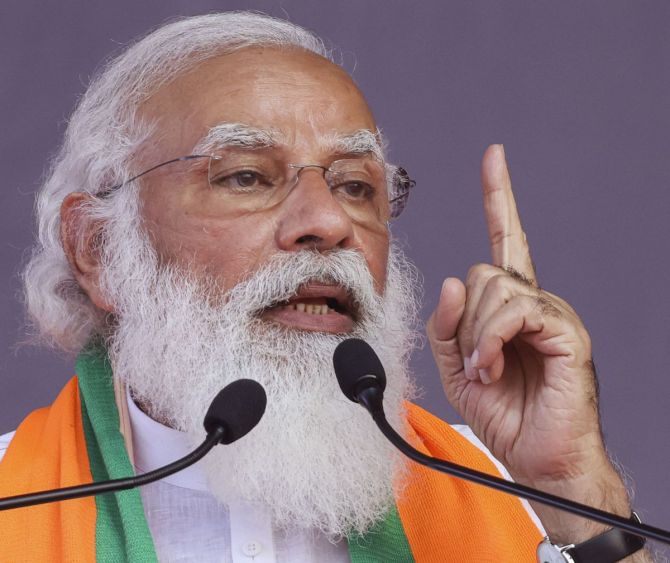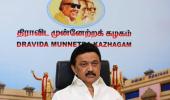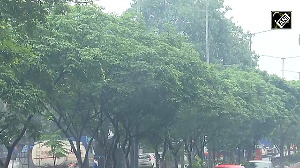Prime Minister Narendra Modi on Sunday said he regrets not being able to learn the world's oldest language Tamil during his long political innings as a chief minister and prime minister.

He stated this during his monthly 'Mann Ki Baat' radio address.
The prime minister said sometimes even a very small and simple question rankles the mind.
"A few days ago Aparna Reddy ji of Hyderabad asked me one such question. She said 'You have been PM for so many years and were CM for so many years. Do you ever feel that something is missing?'" Modi said.
Noting that the question seemed simple but was difficult, he said, "I pondered this over and told myself that one of my shortcomings was that I could not make much effort to learn Tamil, the oldest language in the world; I could not make myself learn Tamil!"
The prime minister praised the Tamil language and its rich literature.
"It is such a beautiful language, which is popular all over the world. Many people have told me a lot about the quality of Tamil literature and the depth of the poems written in it," he said.
Modi highlighted that India is a land of many languages, which symbolise its culture and pride.
Union Home Minister Amit Shah on Sunday apologised to people here for not speaking in Tamil which is one of the 'oldest and sweetest' languages of India.
"I am sad that I cannot talk to you in Tamil that is one of the oldest and sweetest languages of India, I seek your forgiveness," said Shah while addressing a Vijay Sankalp Rally in Villupuram of the poll-bound Tamil Nadu.
He further stated, "Earlier, all announcements at railway stations in Tamil Nadu used to be in English. Now, the announcements are made in Tamil. Prime Minister Narendra Modi has made this change."
'Atmanirbhar Bharat a national spirit'
Modi on Sunday underlined that Atmanirbhar Bharat is not just a government policy but also a national spirit, and said the mantra of self-reliant India is reaching villages of the country.
In his monthly Mann Ki Baat radio programme, Modi also called for a 100-day campaign to clean up all water bodies and prepare them for rain water harvesting before monsoon starts.
Stressing the importance of collective responsibility towards water conservation, he said the Union Jal Shakti Ministry will soon initiate a 'Catch the rain' campaign with its main theme being 'catch the rain, where it falls, when it falls'.
Conveying greetings on the National Science Day, Modi pointed out that this day is dedicated to the discovery of 'Raman Effect' by the great scientist of India, Dr C V Raman.
Asserting that there is a lot of contribution of the power of science in the Atmanirbhar Bharat campaign, Modi said there is a need to make science more popular and that science cannot be limited to physics-chemistry and labs.
He called for expanding science with a mantra of 'lab to land'.
Modi said water has been crucial for the development of humankind for centuries and people should understand their collective responsibility towards its conservation.
He said that in most parts of India, rainfall begins in May-June and asked 'can we right away start a 100-day campaign for the sake of cleaning up water sources around us and conserving rainwater'.
With this very thought in mind, in a few days from now, 'Jal Shakti Abhiyan Catch the rain' is being initiated by the Jal Shakti Ministry, he said.
"We shall commit ourselves to the task right now we shall get existing rainwater harvesting systems repaired, clean up lakes and ponds in villages, remove impediments in the way of water flowing into water sources; thus we shall be able to conserve rainwater to the maximum," he said.
Modi highlighted an assertion made by a person who had written to him from Kolkata that the Atmanirbhar Bharat campaign is not just a government policy but also a national spirit, and said this was hundred per cent correct.
When every person in the country takes pride in indigenous products and connects with the idea of self-reliance, Atmanirbhar Bharat doesn't just remain an economic campaign but becomes a national spirit, he asserted.
"When we see fighter plane Tejas made in our own country doing acrobatics in the sky, when Made in India tanks, Made in India missiles increase our pride, when we see Made in India coaches in Metro trains in wealthy-advanced nations, when we see Made in India Corona vaccines reaching dozens of countries, then our heads are held high," Modi said.
Noting that is not that only bigger things will make India self-reliant, he said, be it textiles Made in India, handicraft goods made by talented artisans of the country, electronic appliances, mobiles, in every field 'we have to raise this pride'.
"When we move forward with this thought, only then will we become self-reliant in the truest sense," the prime minister said.
Modi expressed happiness that the mantra of self-reliant India is reaching the villages.
He cited several examples of people using innovative techniques to emerge as shining examples of Atmanirbhar Bharat, from a person in Bihar's Bettiah starting a LED bulb factory to another person in Uttar Pradesh's Garhmukteshwar reviving his family craft of making mats.
Sharing a guide's voice at the Statue of Unity, informing people in Sanskrit about the tallest statue of Sardar Patel in the world and also cricket commentary in Sanskrit, Modi highlighted that India is home to many languages.
He also batted for sports commentary in different languages and asked why not have good commentaries of different sports and especially Indian sports in more languages.
"We must think about encouraging it. I would urge the Sports Ministry and private institutional partners to think about it," he said.
Noting that the coming few months are of special importance for students with Boards and other exams approaching, Modi said,
"Do all of you remember -- You have to become a warrior not a worrier, go gleefully for the examination and come back with a smile. You have to compete with yourself, not with anyone else."
"Get adequate sleep and be mindful of time management. Do not stop playing, for those who play are the ones that blossom. Revision and smart methods of memorization are to be adopted, that is, overall, in these exams, you have to bring out your best," he said.
He also urged all 'exam warriors', parents and teachers to participate in his upcoming 'Pariksha Pe Charcha' event in March.
In his address, the prime minister also highlighted the positive work being done in the Kaziranga National Park in Assam.
The Kaziranga National Park has been carrying out its Annual Waterfowls Census and it reveals the population of water birds and also about their favourite habitat, Modi said.
"Just two-three weeks ago, the survey was conducted again. You will also be delighted to know that this time the number of water birds has increased by about 175 percent compared to last year. A total of 112 species of birds have been sighted in Kaziranga National Park during this Census," he said.
Of these, 58 species happen to be winter migrants from different parts of the world including Europe, Central Asia and East Asia, he said.
Modi pointed out that the most important reason for this is that here, there is better water conservation along with very little human interference.
He also highlighted how temples in Assam are also playing a unique role in the protection of nature.










